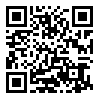Volume 6, Issue 2 (9-2020)
CJP 2020, 6(2): 0 |
Back to browse issues page
Assistant Professor of Psychology, Department of Psychology & Educational Sciences, Faculty of Humanities, Khatam University, Tehran, Iran , a.khodabakhshid@khatam.ac.ir
Abstract: (3720 Views)
Background: Anxiety disorder is the most common type of psychiatric disorders in children. The aim of this study was to compare two anxiety-prevention programs including FRIENDS for Life (FFL) and Coping Cat (CC) for anxious male children.
Methods: This quasi-experimental study was performed using pre- and post-tests with two experimental and control groups. The population of this study included primary schoolchildren in District 5 of Tehran in 2019. Totally, 45 students aged 8 years were selected from 5 schools by cluster random sampling and were randomly assigned into 3 groups of 15. The two experimental groups participated in the one-hour therapy sessions of FFL and CC programs on a weekly basis. The Spence Children's Anxiety Scale (SCAS, 1998) was used to collect research data. Data were analyzed using multiple analysis of covariance (MANCOVA) via SPSS 24.
Results: The results showed that both FFL and CC programs were effective on preschool children's anxiety (F=16.46; P=0.001). However, this effectiveness was not found in control group. Moreover, by examining the pairwise comparison between the effectiveness of the FFL and CC programs, it was observed that the FFL was more effective than the CC for the anxiety of preschool children. The value of Eta coefficient indicated the effectiveness of FFL in all subscales.
Conclusions: Anxiety-prevention programs including FFL and CC have been effective in reducing children's anxiety. Hence, the application of these two interventions in schools helps anxious children to gain a deeper understanding of their various emotions and feelings to reduce their anxiety.
Methods: This quasi-experimental study was performed using pre- and post-tests with two experimental and control groups. The population of this study included primary schoolchildren in District 5 of Tehran in 2019. Totally, 45 students aged 8 years were selected from 5 schools by cluster random sampling and were randomly assigned into 3 groups of 15. The two experimental groups participated in the one-hour therapy sessions of FFL and CC programs on a weekly basis. The Spence Children's Anxiety Scale (SCAS, 1998) was used to collect research data. Data were analyzed using multiple analysis of covariance (MANCOVA) via SPSS 24.
Results: The results showed that both FFL and CC programs were effective on preschool children's anxiety (F=16.46; P=0.001). However, this effectiveness was not found in control group. Moreover, by examining the pairwise comparison between the effectiveness of the FFL and CC programs, it was observed that the FFL was more effective than the CC for the anxiety of preschool children. The value of Eta coefficient indicated the effectiveness of FFL in all subscales.
Conclusions: Anxiety-prevention programs including FFL and CC have been effective in reducing children's anxiety. Hence, the application of these two interventions in schools helps anxious children to gain a deeper understanding of their various emotions and feelings to reduce their anxiety.
| Rights and Permissions | |
 |
This work is licensed under a Creative Commons Attribution-NonCommercial 4.0 International License. |




